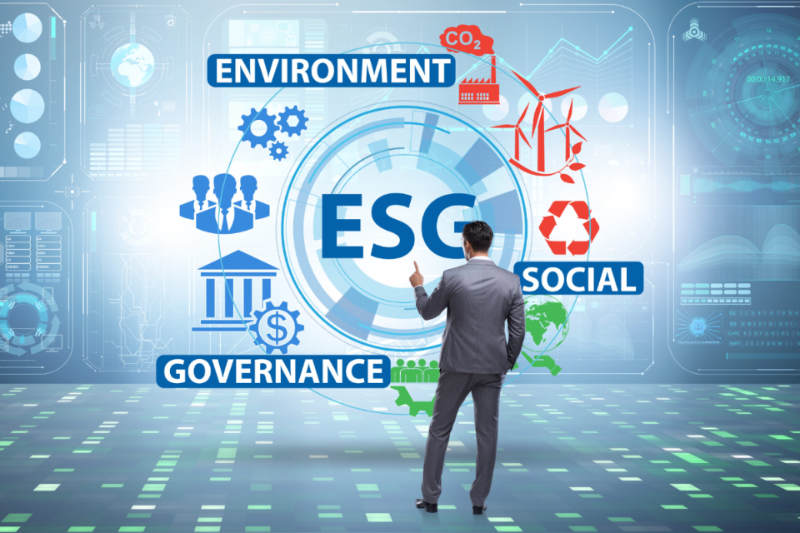In a previous essay, I declared ESG to be a crock. The message was adorned with a lovely illustration intimating a poop emoji. I stand by it but believe an elaboration is required. Relatively fewer readers picked up on the defeated futility in the assessment than those who sincerely piled on to declare ESG a valueless abomination. It is not and this essay is to remedy that misunderstanding.
Despite often clashing with predominant cultural norms of self-centrism and short-termism, the importance of ESG (Environmental, Social, and Governance) as both a moral—and survival—imperative cannot be understated. The environmental alarm is ringing again this year because the snooze delay is over. That ought to be enough, but apparently it’s not. So let’s look at several other reasons why ESG is an extremely important imperative. (Even if it appears to remain an organizational fever dream.)
At its outset, capitalism was subordinate to a prevailing (religious) ethos. It was purposeful for something beyond itself.
1. Environmental Stewardship is Essential for Long-Term Survival
Humanity’s adversarial relationship with the environment has reached a critical juncture. The consequences of climate change, biodiversity loss, and pollution are now alarmingly palpable. Devastating wildfires, recurring floods, food shortages, public health crises… What more is needed to prove environmental responsibility is no longer a distant, theoretical, political idea, but a tangible and costly, urgent concern?
Our planet is showing undeniable signs of distress. The frequency and intensity of natural disasters, from hurricanes to wildfires, are not merely anecdotal observations but have been linked to human-induced climate change (IPCC, 2018). Furthermore, the loss of biodiversity, which the WWF reports is happening at a scale and rate unprecedented in human history, threatens not only wildlife but also human populations that rely on these ecosystems for their livelihoods and well-being.
The environmental component of ESG pushes businesses to consider their environmental footprint, championing sustainable practices that minimize waste, reduce carbon emissions, and promoting conservation. By adhering to this aspect of ESG, companies could not only position themselves as leaders in a movement toward a sustainable future but also ensure they don’t face obsolescence in a world increasingly intolerant of environmentally detrimental practices.
Companies adopting ESG guidelines proactively address environmental challenges. This approach not only mitigates business risks associated with environmental degradation but aligns their operations with global efforts, such as the Paris Agreement, to secure a sustainable future. Moreover, they may (inadvertently) set themselves up strategically with forward-looking, practical offerings for the future.
2. ESG is a Competitive Advantage
Beyond the moral and survival imperatives, ESG can also provide companies with a competitive edge. Consumers, especially younger generations, are ever more discerning about the brands they support. And they are definitely looking for brands that truly align with their values, which increasingly revolve around sustainability, equity, and ethical behavior. By prioritizing ESG—and genuinely walking the talk, companies position themselves to capture a larger share of this growing, conscientious market segment.
A 2019 global survey by Nielsen revealed that 73% of consumers would definitely or probably change their consumption habits to reduce their impact on the environment. This demonstrates a shifting consumer mindset that prizes ethical and sustainable brands. Because: mathematically, 73% of respondents are unlikely to fit solely within the “younger generations” (read: not affluent) category.
Investors also recognize that companies with strong—genuine—ESG performances are often better equipped to navigate future challenges and capitalize on opportunities. It may be as quick and obvious as absent brown M&Ms.[1] As a result, ESG is developing into a key criterion for investment decisions.
The Global Impact Investing Network reported in 2020 that the impact investment market doubled in size from the previous year, indicating a fast-growing appetite among investors for businesses that not only promise returns but also deliver positive social and environmental outcomes.
3. Social Equity is Non-Negotiable
Historically, economic progress has often come at the expense of certain groups of people. Exploitative labor, unfair wages, and lack of access to basic rights and opportunities remain significant, active issues in many parts of the world. Not to mention that elsewhere its scars remain generations later. However, as information becomes more accessible and global movements for equity gain momentum, it’s clear businesses can no longer turn a blind eye.
The social aspect of ESG emphasizes the importance of treating all stakeholders with fairness and respect. Provide equitable working conditions, foster inclusivity, and ensure company practices don’t perpetuate social inequalities. It is not too much to ask is it? Companies that do value social equity not only tap into a broader range of talents and perspectives but also ensure they remain relevant and respected in a world that increasingly values justice and fairness.
Sadly, a 2020 report from the United Nations highlights that despite global advancements, vast social inequalities persist. This includes gender wage gaps, racial and ethnic disparities, and unequal opportunities. Companies that prioritize social equity within their ESG frameworks recognize these disparities are not only morally untenable but bad for business.
Need a financial incentive? Studies, like one from McKinsey in 2018, indicate that companies with diverse workforces are more innovative and financially outperform their counterparts. By addressing social inequalities, businesses not only do right but tap into wider talent pools and consumer bases, setting themselves up for sustainable growth.
4. Governance is the Bedrock of Trust
Until recently, businesses and businesspeople seemed significantly immune to the decay of social trust over the past decades. But corporate scandals, from financial misdeeds to ethical breaches, have eroded public trust in businesses too. A strong governance framework can, however, go a long way toward rebuilding and maintaining this trust. Effective governance ensures companies operate with integrity, transparency, and accountability. That often translates into trustability.
Companies that emphasize governance in their ESG framework are inevitably better equipped to manage risks, make ethical decisions, and maintain the trust of their stakeholders. In an age where reputational risks can have catastrophic consequences, robust governance is not just a moral imperative—it’s a business one.
Enron, Worldcom, and the Volkswagen emissions scandal are classic examples of governance failures with far-reaching consequences (BBC, Reuters). These highlight that without proper oversight, even—or especially—industry giants can falter.
In the age of information, where corporate misdemeanors are quickly exposed and virally disseminated, robust governance is a shield against reputational damage. Moreover, as the Edelman Trust Barometer consistently indicates, trust is a crucial factor in consumer decision-making, further emphasizing the importance of governance in ESG considerations.
5. Redefining Success in the Age of ESG
Prevailing cultural pressures toward selfishness and short-termism, characterized by the relentless pursuit of immediate profits and externalization of cost, often sideline ESG principles. (And, unfortunately, this is all about principles, morals, ethics…) That makes it even more important—essential, even—to ask: What is the purpose of business?
If success is solely measured by quarterly profits or omnipresent optimization, ESG probably seems like a hindrance. But if the purpose of business is broader, encompassing long-term sustainability, stakeholder trust, and positive societal impact, ESG becomes much more an indispensable part of the equation.
Our era demands a shift from myopic definitions of success. It calls for a wider, holistic balancing of profits and purpose. At some point in the not too distant future, survival and relevance of businesses will hinge on its ability to recognize and act on this balance.
In his 2020 annual letter to CEOs, Larry Fink, CEO of BlackRock, emphasized that the world is facing a resounding environmental crisis. Businesses that do not prepare and adapt will face significant financial setbacks. This sentiment underscores that success in the modern business world is not merely about immediate financial gains but also about longevity, adaptability, and societal impact.
Fink and other (thought) leaders advocating for this shift are joined by regulatory bodies and industry coalitions. These are increasingly embedding ESG considerations into their frameworks, signaling a broader transformation in how we define and measure business success. It may be that soon regulation stands in for the moral or the ethical—it would not be the first time. Until then, leaders among businesses would do well to do good without being legally compelled.

Conclusion
In the grand tapestry of human progress, ESG represents a necessary evolution in how we think about business and success. Embracing ESG is not just a nod to trends or a box-checking exercise. It is a recognition of our interconnectedness, our responsibilities to one another, and to the planet. If businesses wish to thrive in the long run, pivoting towards ESG isn’t just the morally right choice; it’s the only choice. As culture evolves, so too should our understanding of what constitutes genuine, enduring success. ESG provides a compass for this journey, pointing the way toward a sustainable, equitable, and prosperous future for all.
The dawn of ESG marks a pivotal shift in the business landscape. While the drive towards ESG may sometimes seem at odds with the prevailing (capitalist) culture of immediate gratification and profit maximization, it offers a more holistic, sustainable, and ultimately profitable way forward. Bear in mind that at its outset capitalism was subordinate to a prevailing (religious) ethos. It was purposeful for something beyond itself. As businesses reorient and embed ESG at the core of their operations, they’re not just paying homage to trends but charting a path for long-term relevance and success. They are also going back to the future.
Institute X is a transformation leadership consultancy and transformation/change leader coaching firm. One of its online presences is The Change Playbook. Be sure to check out the abundance of practical and pragmatic guidance. Subscribe to be notified of new, fresh content.
[1] If you are not familiar with this heuristic test, message me. Or just Google “Van Halen brown M&Ms contract”.

Leave a Reply